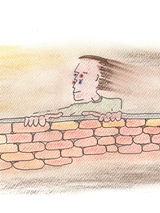Ask yourself or others these questions:
-
What does it mean to pay attention to a person, a situation, a memory, an experience and questions and answers?
-
What is the feeling when the Other pays attention to your person, your situation, your memory, your experiences and your questions and answers?
-
What is attention?
ATTENTION AND WILL
by Simone Weil
We do not have to understand new things, but by dint of patience, effort and method to come to understand with our whole self the truths which are evident.
Stages of belief. The most commonplace truth when it floods the whole soul, is like a revelation.
We have to try to cure our faults by attention and not by will.
The will only controls a few movements of a few muscles, and these movements are associated with the idea of the change of position of nearby objects. I can will to put my hand flat on the table. If inner purity, inspiration or truth of thought were necessarily associated with attitudes of this kind, they might be the object of will. As this is not the case, we can only beg for them. To beg for them is to believe that we have a Father in heaven. Or should we cease to desire them? What could be worse? Inner supplication is the only reasonable way, for it avoids stiffening muscles which have nothing to do with the matter. What could be more stupid than to tighten up our muscles and set our jaws about virtue, or poetry, or the solution of a problem. Attention is something quite different.
Pride is a tightening up of this kind. There is a lack of grace (we can give the word its double meaning here) in the proud man. It is the result of a mistake.
Attention, taken to its highest degree, is the same thing as prayer. It presupposes faith and love.
Absolutely unmixed attention is prayer.
If we turn our minds towards the good, it is impossible that little by little the whole soul will not be attracted thereto in spite of itself.
Extreme attention is what constitutes the creative faculty in man and the only extreme attention is religious. The amount of creative genius in any period is strictly in proportion to the amount of extreme attention and thus of authentic religion at that period.
The wrong way of seeking. The attention fixed on a problem. Another phenomenon due to horror of the void. We do not want to have lost our labour. The heat of the chase. We must not want to find: as in the case of an excessive devotion, we become dependent on the object of our efforts. We need an outward reward which chance
sometimes provides and which we are ready to accept at the price of a deformation of the truth.
It is only effort without desire (not attached to an object) which infallibly contains a reward.
To draw back before the object we are pursuing. Only an indirect method is effective. We do nothing if we have not first drawn back.
By pulling at the bunch, we make all the grapes fall to the ground.
There are some kinds of effort which defeat their own object (example: the soured disposition of certain pious females, false asceticism, certain sorts of self-devotion, etc.). Others are always useful, even if they do not meet with success.
How are we to distinguish between them? Perhaps in this way: some efforts are always accompanied by the (false) negation of our inner wretchedness; with others the attention is continually concentrated on the distance there is between what we are and what we love.
Love is the teacher of gods and men, for no 01w learns without desiring to learn. Truth is sought not because it is jtruth but because it is good.
Attention is bound up with desire. Not with the will but with desire — or more exactly, consent.
We liberate energy in ourselves, but it constantly reattaches itself. How are we to liberate it entirely? We have to desire that it should be done in us — to desire it truly — simply to desire it, not to try to accomplish it. For every attempt in that direction is vain and has to be dearly paid for. In such a work all that I call ‘I’ has to be passive. Attention alone — that attention which is so full that the ‘I’ disappears — is required of me. I have to deprive all that I call ‘I’ of the light of my attention and turn it on to that which cannot be conceived.
The capacity to drive a thought away once and for all is the gateway to eternity. The infinite in an instant.
As regards temptations, we must follow the example of the truly chaste woman who, when the seducer speaks to her, makes no answer and pretends not to hear him.
We should be indifferent to good and evil but, when we are indifferent, that is to say when we project the light of our attention equally on both, the good gains the day. This phenomenon comes about automatically. There lies the essential grace. And it is the definition, the criterion of good.
A divine inspiration operates infallibly, irresistibly, if we do not turn away our attention, if we do not refuse it. There is not a choice to be made in its favour, it is enough not to refuse to recognize that it exists.
The attention turned with love towards God (or in a lesser degree, towards anything which is truly beautiful) makes certain things impossible for us. Such is the non-acting action of prayer in the soul. There are ways of behaviour which would veil such attention should they be indulged in and which, reciprocally, this attention puts out of the question.
As soon as we have a point of eternity in the soul, we have nothing more to do but to take care of it, for it will grow of itself like a seed. It is necessary to surround it with an armed guard, waiting in stillness, and to nourish it with the contemplation of numbers, of fixed and exact relationships.
We nourish the changeless which is in the soul by the contemplation of that which is unchanging in the body.
Writing is like giving birth: we cannot help making the supreme effort. But we also act in like fashion. I need have no fear of not making the supreme effort — provided only that I am honest with myself and that I pay attention.
The poet produces the beautiful by fixing his attention on something real. It is the same with the act of love. To know that this man who is hungry and thirsty really exists as much as I do that is enough, the rest follows of itself.
The authentic and pure values — truth, beauty and goodness — in the activity of a human being are the result of one and the same act, a certain application of the full attention to the object.
Teaching should have no aim but to prepare, by training the attention, for the possibility of such an act.
All the other advantages of instruction are without interest.
Studies and faith. Prayer being only attention in its pure form and studies being a form of gymnastics of the attention, each school exercise should be a refraction of spiritual life. There must be method in it. A certain way of doing a Latin prose, a certain way of tackling a problem in geometry (and pot just any way) make up a system of gymnastics of the attention calculated to give it a greater aptitude for prayer.
Method for understanding images, symbols, etc. Not to try to interpret them, but to look at them till the light suddenly dawns.
Generally speaking, a method for the exercise of the intelligence, which consists of looking.
Application of this rule for the discrimination between the real and the illusory. In our sense perceptions, if we are not sure of what we see we change our position while looking, and what is real becomes evident. In the inner life, time takes the place of space. With time we are altered, and, if as we change we keep our gaze directed towards the same thing, in the end illusions are scattered and the real becomes visible. This is on condition that the attention be a looking and not an attachment.
When a struggle goes on between the will attached to some obligation and a bad desire, there is a wearing away of the energy attached to good. We have to endure the biting of the desire passively, as we do a suffering which brings home to us our wretchedness, and we have to keep our attention turned towards the good. Then the quality of our energy is raised to a higher degree.
We must steal away the energy from our desires by taking away from them their temporal orientation.
Our desires are infinite in their pretensions but limited by the energy from which they proceed. That is why with the help of grace we can become their master and finally destroy them by attrition. As soon as this has been clearly understood, we have virtually conquered them, if we keep our attention in contact with this truth.
Video meliora . . . In such states, it seems as though we were thinking of the good, and in a sense we are doing so, but we are not thinking of its possibility.
It is incontestable that the void which we grasp with the pincers of contradiction is from on high, for we grasp it the better the more we sharpen our natural faculties of intelligence, will and love. The void which is from below is that into which we fall when we allow our natural faculties to become atrophied.
Experience of the transcendent: this seems contradictory, and yet the transcendent can be known only through contact since our faculties are unable to prevent it.
Solitude. Where does its value lie? For in solitude we are in the presence of mere matter (even the sky, the stars, the moon, trees in blossom), things of less value (perhaps) than a human spirit. Its value lies in the greater possibility of attention. If we could be attentive to the same degree in the presence of a human being… We can only know one thing about God — that he is what we are not. Our wretchedness alone is an image of this. The more we contemplate it, the more we contemplate him.
Sin is nothing else but the failure to recognize human wretchedness. It is unconscious wretchedness and for that very reason guilty wretchedness. The story of Christ is the experimental proof that human wretchedness is irreducible, that it is as great in the absolutely sinless man as in the sinner. But in him who is without sin it is enlightened.
The recognition of human wretchedness is difficult for whoever is rich and powerful because he is almost invincibly led to believe that he is something. It is equally difficult for the man in miserable circumstances because he is almost invincibly led to believe that the rich and powerful man is something.
It is not the fault which constitutes mortal sin, but the [degree of light in the soul when the fault, whatever it may be, is accomplished.
Purity is the power to contemplate defilement.
Extreme purity can contemplate both the pure and the [impure: impurity can do neither: the pure frightens it, the impure absorbs it. It has to have a mixture.
From Gravity and Grace, translated by Emma Craufurd, Routledge and Kegan Paul, London, 1952. Originally published as La Pesanteur et la Grace, Plon, Paris, 1947.




























